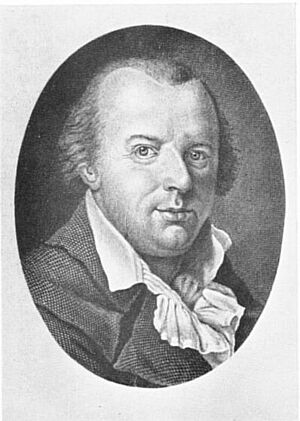Johann Friedrich Reichardt facts for kids
Johann Friedrich Reichardt (born November 25, 1752 – died June 27, 1814) was a talented German musician. He was a composer, a writer, and a music critic. This means he wrote music, wrote about music, and shared his opinions on music.
Contents
Early Life
Johann Friedrich Reichardt was born in Königsberg, a city in what was then called East Prussia. His father, Johann Reichardt, was a musician too. He played the lute (a stringed instrument like a guitar) and was a "Stadtmusiker," which means a city musician.
Johann Friedrich started learning music when he was very young. He played the violin, keyboard, and lute. One of his teachers was Timofey Belogradsky. When Johann Friedrich was ten, his father took him and the choir he sang in, called the "Wunderknaben" (meaning "wonder boys"), on a music tour.
Later, a famous thinker named Immanuel Kant encouraged Reichardt to study. So, from 1769 to 1771, Reichardt studied law (Jurisprudence) and philosophy in Königsberg and Leipzig. In 1771, he decided not to work in civil service. Instead, he went on a tour as a very skilled musician.
He returned to Königsberg in 1774 and became a "Kammersekretär" (Chamber Secretary) in Ragnit. Reichardt sent his opera Le feste galanti to King Friedrich II of Prussia. The king was impressed and appointed him as the Royal Prussian Court Kapellmeister. This was a very important job, like being the main music director for the royal court.
Just two years later, he left this job. He married Juliane Benda, who was a singer, pianist, and composer. They had a daughter, Louise Reichardt, who also became a well-known songwriter.
Later Career
In 1783, Reichardt traveled to Italy. On his way back, he stopped in Vienna. There, he met Emperor Joseph II and the famous composer Christoph Willibald Gluck. He also took music trips to France and England, but they didn't go as well as he hoped. So, he returned to Berlin.
In 1786, he became good friends with several important German writers. These included Johann Wolfgang von Goethe, Johann Gottfried Herder, and Friedrich Schiller.
Reichardt tried again to find success in Paris, but it didn't work out. However, he became very interested in the ideas of the French Revolution. This was a big change in France where people wanted more freedom and equality.
In 1792, Reichardt wrote a book called Vertraute Briefe (Intimate Letters). Because he seemed to support the French Revolution, he lost his job as Court Kapellmeister in 1794. He moved to Hamburg and started a journal called Frankreich. From 1794, he lived in Giebichenstein, near Halle.
In 1796, he was forgiven for his support of the revolution. He was then appointed as the director of the salt mine in Halle. From there, he often went to Berlin to lead the first performances of his music.
In 1802, he took another trip to Paris. This trip made him less fascinated with France and its politics. He became an opponent of Napoleon. Four years later, French troops plundered his home. He fled to Danzig, where he worked as a patriot and fought for freedom.
Napoleon's brother, Jérôme Bonaparte, who was in Kassel, allowed Reichardt to return. In 1807, Jérôme named him Theater Director. This job only lasted nine months. In November 1809, Reichardt traveled to Vienna, hoping to find success there. He heard the music of Haydn, Mozart, and Beethoven. He started to appreciate the Viennese Classical style, even though it was a bit late in his life.
Soon after, he returned to Giebichenstein. He died there alone from a stomach illness. His stage works were quickly forgotten after his death. However, his simple songs (Lieder) and ballads, written in a "folk style," remained popular for a long time, especially with the Wandervogel movement.
Works
Reichardt is mainly known for his Lieder, which are songs for a singer and piano. He wrote about 1,500 of them, using words from about 125 different poets. Many of his songs used texts by Goethe, and some even influenced Franz Schubert, another famous composer.
He was also known for his Singspiele. This was a type of German opera that included spoken dialogue, like a musical play. He improved this style with help from Goethe. He also wrote 49 songs using texts by Johann Gottfried Herder.
Besides his music, Reichardt's writings are still valuable today. The famous collection of poems called Des Knaben Wunderhorn was dedicated to Reichardt. This was likely because the authors hoped he would set the poems to music, but he never did.
Stage Works
You can find a full list of his stage works here: List of works for the stage by Johann Friedrich Reichardt.
Writings
- Briefe eines aufmerksamen Reisenden, die Musik betreffend (1774–76) (Letters of an observant traveler, about music)
- Über die deutsche komische Oper (1774) (About German Comic opera)
- Musikalische Kunstmagazin (1781–1792) (Musical Art Magazine)
- Studien für Tonkünstler und Musikfreunde (1793) (Studies for musicians and music lovers)
- Vertraute Briefe aus Paris (1804) (Intimate letters from Paris)
- Vertraute Briefe aus Wien (1810) (Intimate letters from Vienna)
- Other writings about music and his travels
See also
 In Spanish: Johann Friedrich Reichardt para niños
In Spanish: Johann Friedrich Reichardt para niños
 | May Edward Chinn |
 | Rebecca Cole |
 | Alexa Canady |
 | Dorothy Lavinia Brown |


